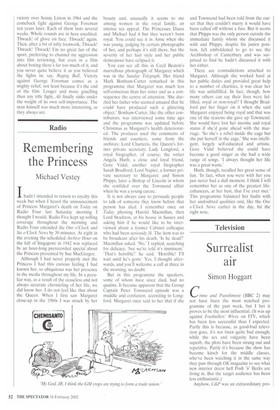Remembering the Princess
Michael Vestey
Ihadn't intended to return to royalty this week but when I heard the announcement of Princess Margaret's death on Today on Radio Four last Saturday morning I thought I would. Radio Five kept up rolling coverage throughout the morning and Radio Four extended the One o'Clock and Six o'Clock News by 30 minutes. At eight in the evening the scheduled Archive Flour on the fall of Singapore in 1942 was replaced by an hour-long prerecorded special about the Princess presented by Sue MacGregor.
Although I had never properly met the Princess I had this curious feeling I had known her, so ubiquitous was her presence in the media throughout my life. In a peculiar way, as a result of the ceaseless and not always accurate chronicling of her life, we did know her. I do not feel like that about the Queen. When I first saw Margaret close-up in the 1960s I was struck by her beauty and, unusually it seems to me among women in the royal family, an intense sex appeal. The Princesses Diana and Michael had it but they weren't born royal. You could sec it in Anne when she was young, judging by certain photographs of her, and perhaps it's still there, but the severity of her hair style and her public demeanour have eclipsed it.
You can see all this in Cecil Beaton's marvellous photograph of Margaret which was in the Sunday Telegraph. Her friend Mark Bonham-Carter remarked in this programme that Margaret was much less self-conscious than her sister and as a consequence the centre of attention. 'She dazzled her father who seemed amazed that he could have produced such a glittering object.' Bonham-Carter, like the other contributors, was interviewed some time ago and the programme was updated before Christmas as Margaret's health deteriorated. The producer used the comments of friends and courtiers, some from the archives: Lord Charteris, the Queen's former private secretary; Lady Longford, a royal biographer, of course; the writer Angela Huth; a close and loyal friend, Gore Vidal; another royal biographer Sarah Bradford; Lord Napier, a former private secretary to Margaret; and Simon Phipps, later a Bishop of Lincoln in whom she confided over the Townsend affair when he was a young curate.
It is not always easy to persuade people to talk of someone they know before that person has died. I remember once on Today phoning Harold Macmillan, then Lord Stockton, at his house in Sussex and asking him if he would like to be interviewed about a former Cabinet colleague who had been seriously ill. The item was to be broadcast after his death. 'Is he dead?' Macmillan asked. 'No.' I replied, searching for delicacy, 'but we're told it's imminent.' 'That's horrible!' he said. 'Horrible! I'll wait until he's gorn.' Yes. I thought afterwards, and you'll welcome a call at three in the morning, no doubt.
But in this programme the speakers, some of whom have since died, had no qualms. It became apparent that the Group Captain Peter Townsend episode was a muddle and confusion, according to Longford. Margaret once said to her that if she and Townsend had been told from the outset that they couldn't marry it would have been called off without a fuss. But it seems that Phipps was the only person outside the immediate family whom she discussed it with and Phipps, despite his junior position, felt emboldened to go to see the Archbishop of Canterbury and was surprised to find he hadn't discussed it with her either.
There are contradictions attached to Margaret. Although she worked hard at her public duties and provided great help to a number of charities, it was clear her life was unfulfilled. In fact, though, how many others can say their lives were fulfilled, royal or non-royal? I thought Bradford put her finger on it when she said Margaret enjoyed being royal and that was one of the reasons she gave up Townsend. She would have lost her income and royal status if she'd gone ahead with the marriage. 'So she's a rebel inside the cage but she put herself in the cage.' She was intelligent, largely self-educated and artistic. Gore Vidal believed she could have become a good singer as she had a wide range of songs. 'I always thought her life was a great waste.'
Huth. though, recalled her great sense of fun. 'In fact, when you were with her you just never had a dull moment. I think I will remember her as one of the greatest lifeenhancers, at her best, that I've ever met.' This programme balanced her faults with her undoubted qualities and, like the One o'Clock News earlier in the day, hit the right note.




































































 Previous page
Previous page